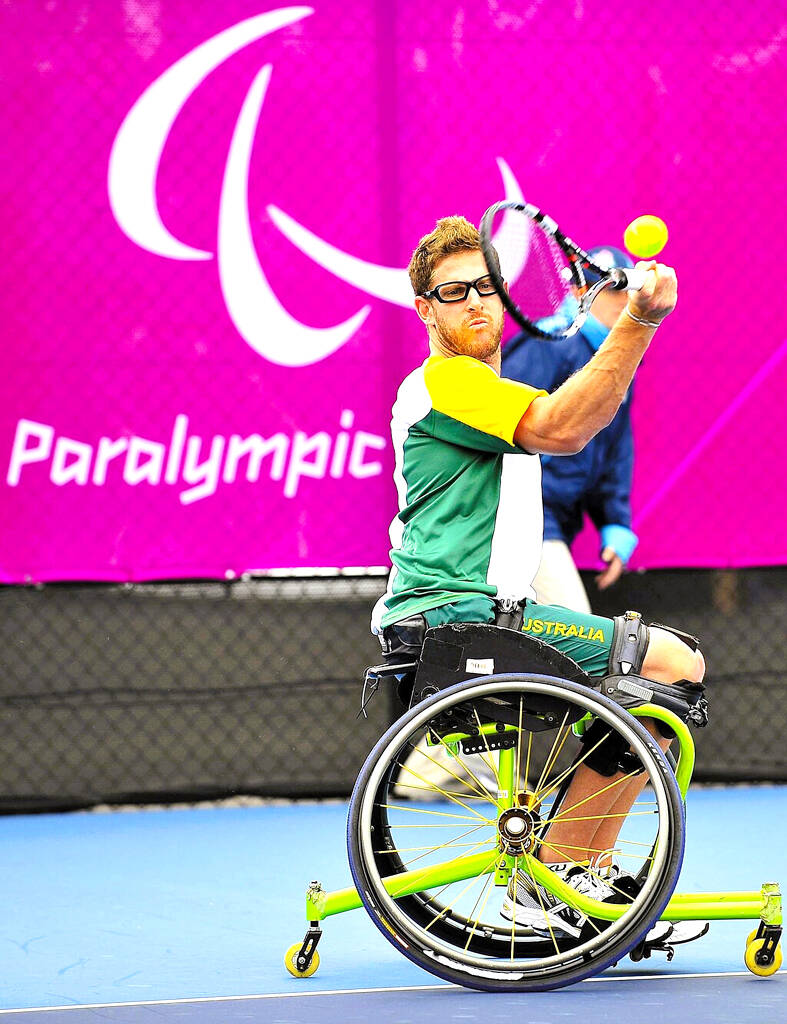對話 Dialogue
清清:奧運會才剛閉幕,緊接著帕運就要登場了,真是運動迷的福音!
Qīngqing: Àoyùnhuì cái gāng bìmù, jǐnjiēzhe Pàyùn jiùyào dēngchǎngle, zhēnshì yùndòng mí de fúyīn!

Photo courtesy of Wikimedia commons 照片:Wikimedia commons 提供
華華:你說的帕運,是不是殘障奧運啊?
Huáhua: Nǐ shuō de Pàyùn, shì búshì Cánzhàng Àoyùn a?
清清:是的,我個人覺得,那些運動員身體雖然都有不方便的地方,但運動精神和能力都值得我們敬佩學習,所以比較喜歡用翻譯帕拉林匹克的名字,來叫它帕運。
Qīngqing: Shìde, wǒ gèrén juéde, nàxiē yùndòngyuán shēntǐ suīrán dōu yǒu bù fāngbiàn de dìfāng, dàn yùndòng jīngshén hé nénglì dōu zhídé wǒmen jìngpèi xuéxí, suǒyǐ bǐjiào xǐhuān yòng fānyì Pàlālínpīkè de míngzì, lái jiào tā Pàyùn.
華華:同意,每次看到那些殘障運動員賣力為國家和自己爭取榮譽的身影,就特別感動,我想我是做不到的。
Huáhua: Tóngyì, měicì kàndào nàxiē cánzhàng yùndòngyuán màilì wèi guójiā hàn zìjǐ zhēngqǔ róngyù de shēnyǐng, jiù tèbié gǎndòng, wǒ xiǎng wǒ shì zuòbúdào de.
清清:這次帕運包括了22個體育項目,一共有185個國家的運動員參賽,肯定也是相當精采!
Qīngqing: Zhècì Pàyùn bāokuòle èrshí'èr ge tǐyù xiàngmù, yígòng yǒu yìbǎi bāshíwǔ ge guójiā de yùndòngyuán cānsài, kěndìng yě shì xiāngdāng jīngcǎi!
華華:開幕式是什麼時候啊?
Huáhua: Kāimùshì shì shénme shíhòu a?
清清:台灣時間是8月29號凌晨1點半,在巴黎的協和廣場舉行,這是帕運會歷史上第一次在戶外場地辦開幕式喔!
Qīngqing: Táiwān shíjiān shì qī yuè èrshíqī hào língchén yì diǎn bàn, zài Bālí de Xiéhé Guǎngchǎng jǔxíng, zhè shì Pàyùnhuì lìshǐ shàng dì yī cì zài hùwài chǎngdì bàn kāimùshì o!
華華:我絕對不會錯過!準備好炸雞跟珍奶,熬夜看轉播也是幸福的!
Huáhua: Wǒ juéduì búhuì cuòguò! Zhǔnbèi hǎo zhájī gēn zhēnnǎi, áoyè kàn zhuǎnbò yěshì xìngfú de!
翻譯 Translation
Qingqing: The Olympics just concluded, and now the Paralympics are about to start. It’s a great time for sports fans!
Huahua: When you say the Paralympics, do you mean the games for athletes with disabilities?
Qingqing: Yes, I personally feel that although these athletes have physical limitations, their sportsmanship and abilities are truly admirable and something we can all learn from. That’s why I prefer to call it the Paralympics.
Huahua: I agree. Every time I see those athletes striving to earn honor for their country and themselves, I am deeply moved. I don’t think I could do that.
Qingqing: This time round, the Paralympics will include 22 sports, with athletes from 185 countries participating. It’s going to be quite exciting!
Huahua: When is the opening ceremony?
Qingqing: It will be at 1:30am Taiwan time on Aug. 29, held at the Place de la Concorde in Paris. This is the first time in Paralympic history that the opening ceremony will be held in an outdoor venue.
Huahua: I wouldn’t miss this for the world. I’ll get ready with fried chicken and bubble tea. Staying up late to watch the broadcast is going to be a real treat!
生詞 Vocabulary
1. 帕運 (Pàyùn) Paralympics
2. 閉幕 (bìmù) closing, closure
3. 福音 (fúyīn) good news
4. 殘障 (cánzhàng) disability, impairment
5. 運動員 (yùndòngyuán) athlete
6. 賣力 (màilì) put in a lot of effort, working hard
7. 榮譽 (róngyù) honor
8. 凌晨 (língchén) early morning
教材音檔 Audio Files
國立清華大學華語中心提供
By National Tsing Hua University Chinese Language Center:

In an effort to fight phone scams, British mobile phone company O2 has introduced Daisy, an AI designed to engage phone con artists in time-wasting conversations. Daisy is portrayed as a kindly British granny, exploiting scammers’ tendency to target the elderly. Her voice, based on a real grandmother’s for authenticity, adds to her credibility in the role. “O2” has distributed several dedicated phone numbers online to direct scammers to Daisy instead of actual customers. When Daisy receives a call, she translates the scammers’ spoken words into text and then responds to them accordingly through a text-to-speech system. Remarkably, Daisy

Bilingual Story is a fictionalized account. 雙語故事部分內容純屬虛構。 Emma had reviewed 41 resumes that morning. While the ATS screened out 288 unqualified, she screened for AI slop. She could spot it a mile away. She muttered AI buzzwords like curses under her breath. “Team player.” “Results-driven.” “Stakeholder alignment.” “Leveraging core competencies.” Each resume reeked of AI modeling: a cemetery of cliches, tombstones of personality. AI wasn’t just changing hiring. It was draining the humanity from it. Then she found it: a plain PDF cover letter. No template. No design flourishes. The first line read: “I once tried to automate my

Every May 1, Hawaii comes alive with Lei Day, a festival celebrating the rich culture and spirit of the islands. Initiated in 1927 by the poet Don Blanding, Lei Day began as a tribute to the Hawaiian custom of making and wearing leis. The idea was quickly adopted and officially recognized as a holiday in 1929, and leis have since become a symbol of local pride and cultural preservation. In Hawaiian culture, leis are more than decorative garlands made from flowers, shells or feathers. For Hawaiians, giving a lei is as natural as saying “aloha.” It shows love and

1. 他走出門,左右看一下,就過了馬路。 ˇ He walked outside, looked left and right, and crossed the road. χ He walked outside and looked left and right, crossed the road. 註︰並列連接詞 and 在這句中連接三個述語。一般的結構是 x, y, and z。x and y and z 是加強語氣的結構,x and y, z 則不可以。 2. 他們知道自己的弱點以及如何趕上其他競爭者。 ˇ They saw where their weak points lay and how they could catch up with the other competitors. χ They saw where their weak points lay and how to catch up with the other competitors. 註:and 一般連接同等成分,結構相等的單詞、片語或子句。誤句中 and 的前面是子句,後面是不定詞片語,不能用 and 連接,必須把不定詞片語改為子句,and 前後的結構才相等。 3. 她坐上計程車,直接到機場。 ˇ She took a cab, which took her straight to the airport. ˇ She took a cab and it took her straight